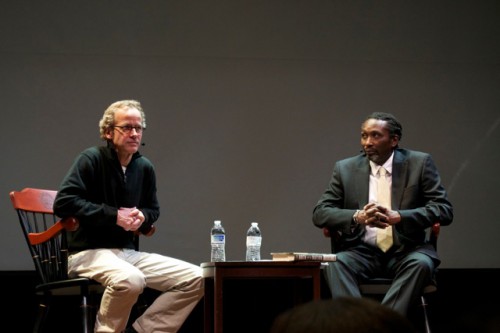By Sam Humphrey
An obscure newspaper editor and one of the oldest films of all time were the topics at one of the last Ford Hall Forums of the season.
Richard Lehr, a journalism professor at Boston University and a veteran of The Boston Globe, discussed his new book, “The Birth of a Nation,” which details the controversy around the 1915 film of the same name. The event was moderated by Robert Bellinger, a history professor and director of both the Black Studies program and the Collection of African-American Literature at Suffolk.
The film, directed by D.W. Griffith, follows the story of two families, one from the North and one from the South, through the Civil War and Reconstruction era. It sparked controversy for its dehumanizing portrayal of African-Americans, which drew criticism from around the country. Though controversial, it was also hugely successful.
“It was the Star Wars of its time,” Lehr said, calling it “the first blockbuster of the U.S.A.”
However, its racist portrayal of blacks prompted William Monroe Trotter, the co-founder and editor of The Boston Guardian, a newspaper whose target audience was individuals of African-American descent, to fight its release. Trotter founded the Guardian to challenge Booker T. Washington, the leading voice in America at the time, Lehr said. Though, when Lehr asks his students who Trotter was, only a handful know the name.
He “was trying to break into the white media to say that Booker T. Washington did not speak for all black Americans,” Lehr said, which was notable because Washington had served as an advisor to Presidents Theodore Roosevelt and William Howard Taft.
The son of a Union soldier and a Harvard graduate, Trotter tried to prevent any screenings of the movie in Boston, as he considered it too offensive, according to Lehr.

“I was surprised that a newspaper guy was trying to shut down a movie,” but film was new at the time, Lehr said. In 1910, he succeeded in persuading Boston mayor John Fitzgerald to shut down stage productions of “The Clansman: An Historical Romance of the Ku Klux Klan” by Thomas Dixon Jr., which served as the basis for “The Birth of a Nation.”
However, James Curley, who succeeded Fitzgerald as mayor, did not shut down screenings of the film, which drew protests in Boston, Lehr said.
Infamously, “The Birth of a Nation” was the first film to be shown in the White House. President Woodrow Wilson knew Dixon, the author, from college, and Dixon organized a private showing of the film in the White House. Although Wilson had wished to keep the screening unknown, Griffith, the director, told The Los Angeles Times it had been shown in the White House.
While Griffith did not specifically name the president, he said that a “high ranking official” had said the film was like “‘writing history with lightning,’” according to Lehr. Trotter had previously met Wilson and criticized him for his approval of segregationist policies, though Trotter’s conduct in the meeting drew negative attention from the press.
“I admire Trotter for talking tough to power,” Lehr said.
Trotter peaked in 1915 following the controversy of the film and faded from the public. He died at 62 after falling from his roof on his birthday, April 7, 1934. By then, his mental state had deteriorated, and whether his death was accidental or not has since been called into question.
“Part of me doesn’t want him to have committed suicide, but the evidence suggests he was a very troubled man,” Lehr said.
The last forum for this semester will host Kristin Beck, a former Navy SEAL who began her transition from male to female after leaving the service. The forum will be Thursday, Dec. 4 in the C. Walsh theater at Suffolk.













